Hushang Ibtihaj (Sayih)
Ibtihaj, Amir Hushang Sami'i Gilani (H.A.Sayih; b. 1928), an Iranian musicologist and poet with the nom de plume Sayih (shadow). He was born on 26 February in Rasht and his father was Aqa Khan Ibtihaj, a distinguished figure in Rasht who served for a while as the director of the Pursina Hospital of that city. He received his primary schooling in his hometown but spent his high school years in Tehran. His first collection of poetry appeared in those years under the title of Nakhustin Naghmih-ha (First Songs). He began by composing lyrical poetry, but he turned to socially realistic poetry in his collection, Shabgir (Nocturnal Song), the fruit of the turbulent years before 1953. He served as the general director of the state run cement company in Tehran and from 1972 to 1979 was the director of the Gulha-yi Tazih (Fresh Flowers) programs at Radio Tehran. Following Davud Pirniya's resignation, Sayih was the founder of the musical program Gulchin-i Haftih (Weekly Anthology). Many of his ghazals have been sung and recorded. In his youth Ibtihaj was in love with Galiya, an Armenian young woman residing in Rasht and his love for her led him to compose lyrical poems. Later, when Iran was entangled with bloodshed, war, and crises, he made reference to his relationship with Galiya in a poem and his poetry reflected a social hue. Ibtihaj wrote ghazals in his youth and in composing them, he was a recluse, free from ostentation, rarely frequenting literary circles. He socialized only with few like-minded poets. He oftentimes retired to his room and composed ghazals to publish them in periodicals. Similar to Shahriyar, he first made attempts to follow Nima's footsteps, but his disposition, as a ghazal composer was not conducive to modern and social realistic tendencies of Nima's poetry, particularly after the publication of Quqnus (Phoenix); as a consequence, he proceeded with composing ghazals. Sayih must be regarded as the best contemporary Iranian ghazal versifier. Although his poetry composed in all genres is appealing, but his ghazals are imbued with a different passion and many authorities in the domain of poetry consider him only second to Hafiz in composing ghazals. He published his first collection, Naghmih-ha (Songs), composed in the classical style, in 1946, when he had not been encountered Nima. His first collection written in the modern style was Sarab (Mirage), though it was composed in the genre of chahar-parih (double-couplets) with themes of of love and also individuality, real, natural feelings and sentiments. The work displays the poets further mastery in composing poetry and reveals his own idiosyncratic style and characteristics. The poems included in this collection are quite remarkable in terms of poetical genre, modernity, and originality of feelings and perceptions. Nonetheless, his later compositions reflect his sympathies for the comman man and his compositions take on a different a different hue.
The collection entitled Siyah-mashq (Calligraphic Practice Sheets) was published after Sarab, though the former includes the poems written in 1946-1950. Sayih published some of his ghazals in this collection and revealed his skills in writing poetry in this genre. Some of them are regarded as the best ghazals of the time. Shabgir (Daybreak), another collection published in 1953, represents his novel thoughts that created remarkable social poems in this light. The collection, Chand Barg az Yalda (A Few Leaves from Yalda [viz. winter solstice 1965) opened a bright and new path in contemporary poetry. Sayih's poetry is regarded as pleasant and readable in contemporary Persian ghazals. His poetry is marked by appealing motifs, innovative imagery, similes, and metaphors, and fluent, rhythmic, graceful, language harmonious with the ghazal, and its delicately social hue is reminiscent of his pleasant style. His well-known ghazals include Duzakh-i Ruh (Soul's Hell), Shabikhun (Night Attack), Khunbaha (Blood Money), Giryih-yi Liyli (Liyli's Weeping), Chashmi Kinar-i Panjarih-yi Intizar (An Eye by the Window of Awaiting), and Naqsh-i Digar (Another Pattern). His novel poetry also includes a new and innovative themes and his eloquent and powerful language, harmonious with such innovative themes, has given birth to favorable results. Hushang Ibtihaj, Manuchihr Niyistani, Husayn Munzavi, Muhammad 'Ali Bahmani, and Simin Bihbahani are among the distinguished poets writing ghazals in the post-Nima era. Ibtihaj's works include: Zamin (The Earth; 1955); Yadnamih (Memorial; 1969); Tarjumih-yi Shi'ir-i Tumaniyan Sha'ir-i Armani (Translation of the poetry of Tumaniyan, an Armenian Poet; in collaboration with Nadirpur, Galust Khanins, and Ruban); Ta Subh-i Shab-i Yalda (Until the Morning of the Night of winter solstice; 1981); Yadigar-i Khun-i Sarv (Memento of the Blood of Cypress; 1981); Hafiz bih Sa'y-i Sayih (The Divan of Hafiz edited by Sayih); Divan-i Hafiz ba Tashih-i Ibtihaj (The Divan of Hafiz edited by Ibtihaj); Tasiyan (in Gilaki, Sorrow tinged with restlessness); Ash'ar-i Ibtihaj dar Qalibi Nu (Ibtihaj's Poetry in a New Genre). Sayih resides in Germany and Iran.
Sukhanvaran-i Nami-yi Mu'asir-i Iran (3, 1711-1712); Nam-namih-yi Musiqi-yi Iran Zamin (A Biographical Dictionary of Music of the Land of Iran; 3,218).



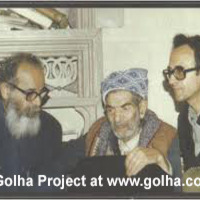
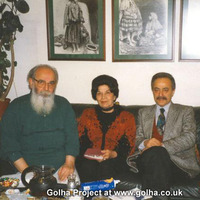
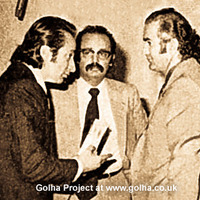

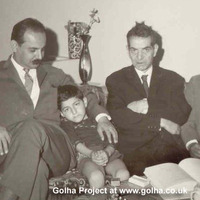

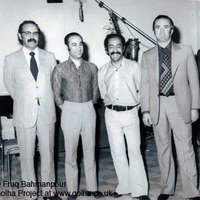
 In association with The Iran Heritage Foundation © All rights reserved 2025. Jane Lewisohn | Website by
In association with The Iran Heritage Foundation © All rights reserved 2025. Jane Lewisohn | Website by